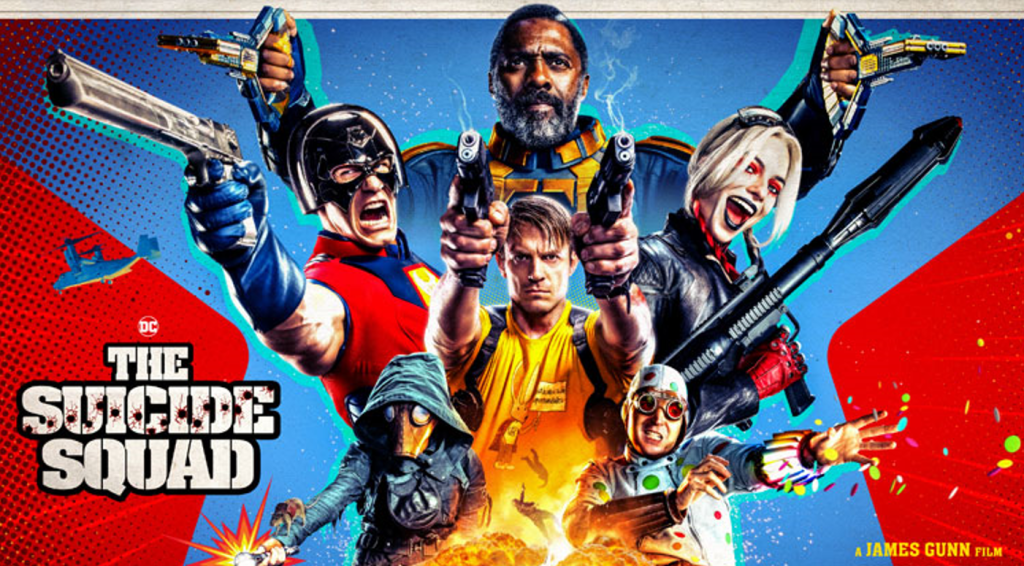
By Madeleine McDonald
Director: James Gunn
Cast: Margot Robbie, John Cena, Idris Elba, Viola Davis, Sylvester Stallone, Joel Kinnaman, Michael Rooker, David Dastmalchian, Daniela Melchior, Sean Gunn, Jai Courtney, Pete Davidson, Jennifer Holland, Steve Agee, Nathan Fillion, Mayling Ng, Flula Borg, Taika Waititi, and more
Released: August 5th, 2021
Spoilers: Mild
As described by its director James Gunn, The Suicide Squad is neither a sequel nor reboot. Rather, Gunn melds these two together by introducing new characters from the DC roster whilst keeping a familiarity of the 2016 film with a couple of returning ones. However, what Gunn has been able to do that his predecessor David Ayer did not (even accounting for studio meddling) is to lean into the disposability of The Suicide Squad.
In the film, Amanda Waller (Viola Davis) recruits a new squad, or Task Force X as they prefer to be called, to infiltrate the island of Corto Maltese and destroy “Project Starfish”.
James Gunn has many talents. The first you notice in TSS is his skill at choosing music. From the opening scene, Johnny Cash’s Folsom Prison Blues is what you hear even before entering the world of lethal missions. Never could a more perfect song capture the disenfranchised mood of the inmates of Belle Reve prison. The Jim Carroll Band’s People Who Died, a great upbeat song about death, perfectly fits over a recap of Task Force X’s members who do not make it past the credits sequence too. While the romantically wistful Whistle For The Choir from The Fratellis complements the mood of Harley’s courtship at the Corto Maltese Palace. A song that is not only for the audience’s benefit in gauging the scene’s tone, but is diegetic as well, playing through the speakers of the palace as Harley and her beau sit down together. Gunn has spoken about writing songs into his scripts and the impact shows here. It is a vast improvement from precursor Suicide Squad, whose song choices, although full of classics like Rolling Stone’s Sympathy for the Devil, were as carefully chosen as hitting shuffle on Spotify.
Another point of difference between SS and its rebequel (reboot-sequel) is the treatment of their characters. Much of SS was focused on Deadshot (Will Smith) and Harley Quinn (Margot Robbie), with the rest of the team treated as mere accessories. This time around under Gunn, he gives all of the main roster their moments to shine. Bloodsport (Idris Elba) and Peacemaker (John Cena) have their gunslinger battle royale (one to hilarious effect in a rebel village). Ratcatcher 2 (Daniela Melchior) alleviates the film’s dark tones with heart. Davis, another returning actor, is allowed to flex her chops a lot more, supplied with plenty of material to demonstrate how devious Waller truly is. One of her many vile ruses: to get Bloodsport on board by orchestrating his teenage daughter to be tried in an adult court and threatening to have her sent to the same prison as him. King Shark meanwhile is the Groot of the group, an endearing killing machine, proving once again Gunn can make any character loveable. Another example of his powers to do this is that the most sympathetic character of TSS is the Polka-Dot Man (David Dastmalchian).
Originally a minor Batman villain whose abilities were using technology to manipulate the polka dots on his suit, here he has been rewritten more as a tragic figure. Real name Abner Krill, he uses a combo of motherly issues and technology to eject polka dots directly from his body. Another divergence from the comics is his origin story, his powers the result of an experiment performed by his mother. However, as the first night in the jungle on Corto Maltese demonstrates, there is a downside to Krill’s polka powers. When not expelled, his appearance looks like something straight out of Universal’s classic monsters era. It is an impressive display of practical effects from Legacy Effects (the same company that designed Grogu from The Mandalorian).
When you have one character move across a few movies in the same cinematic universe, directors and their writers have the liberty to alter them not always for the better (see Wonder Woman in Justice League). Thankfully, Harley is one that changed for the better. From SS to Birds of Prey (and the Fantabulous Emancipation of One Harley Quinn), the influences of a female director and writer in Cathy Yan and Christina Hodson moved Harley away from patriarchal dynamics to a more feminist direction. Gunn (working alongside Robbie) validates the growth Harley went through. Nowhere on her body does it declare her as ‘Property of Joker’. She wears a ‘Live Fast Die Clown’ jacket and ‘Property of No One’ tattoo, and she doesn’t ignore the red flags in her new beau… she shoots him instead (something I think a lot of us wish she’d do to Joker).
The Suicide Squad is a film full of gore, humour, action, and dark themes such as wartime human experimentation. It is a film that feels more like an ensemble than its predecessor. No one character is held up on a pedestal based on the actor’s star level. Whilst Peter Capaldi’s Thinker falls a bit flat, nearly every cast member shines in their roles, bringing something to love to each of these rebels without a cause. Gunn expertly works his magic in these ways to bring forth a film that not only fits into DC’s cinematic universe, but which showcases a standard that any future DC film should follow.
Rating: 4 stars out of 5
Find out where to watch The Suicide Squad (2021) here.